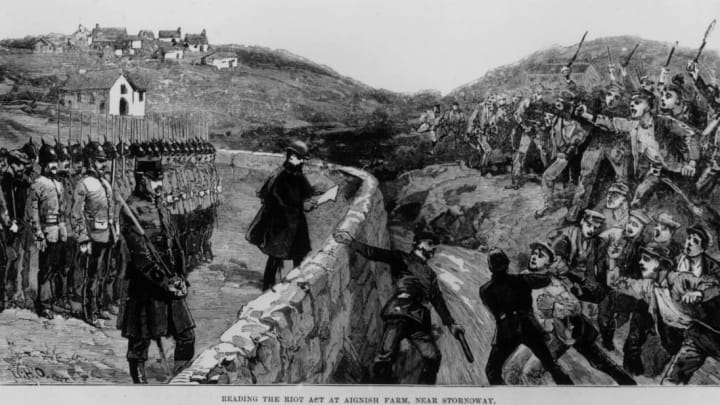In 2011, NBC published a guide on how employees could "read the riot act" to their subordinates. Professional footballer Stéphane Mahé was once "read the riot act" after fouling a rival player so hard he needed four stitches. In Bibb County, Georgia, a Superior Court Judge "read the riot act" to a group of wayward teens in an effort to curb their bad behavior.
The idiom, which has been in use for centuries, is generally thought to mean the admonishment of a person or persons who have committed an error in judgment. But the origin of the term "riot act" concerns a very particular wrongdoing—an unlawful public assembly that peace officers of the 18th century fought with a pre-written warning to disperse or face serious repercussions. Like death.
Atlas Obscura reports that the riot act was first passed by British Parliament in 1714 and took effect on August 1, 1715. At its core, the Act served as what linguists refer to as a speech act: a word, phrase, or order that carries real weight. (Think of an ordained minister pronouncing a couple husband and wife.) If confronted with a rowdy crowd, an authoritarian would arrive and—this was crucial—read the Act aloud in order to serve formal notice that the parties involved were overstepping their bounds.

The Act was passed in haste because supporters of the Catholic Jacobite political movement had been voicing their disapproval of King George I. A "riot" was any group of 12 or more people that was engaged in public disharmony. Typically, the raucous formation would be given 60 minutes to take a hike. If not, their just punishment would be prison, labor, or death. If the peace officer believed danger was imminent, he wouldn't have to wait the whole hour: He could deputize citizens to try and break up the gathering.
To enforce the Act and any punishments, the officer had to punctuate the reading by shouting, "God save the King!"
Scholars have wondered how successful such orators were in scolding a large assembly of angry protestors. In 1768, the answer was: not very. People opposing the imprisonment of radical John Wilkes ignored the Riot Act and suffered shots of musket ball, which killed seven.
The Riot Act was officially repealed in England and Wales in 1967 as part of some legislative housekeeping. Today, it's almost always used as a figure of speech, although Belize still recognizes it as a meaningful method of crowd dispersal. In 2017, police officers drew criticism for launching tear gas into a People's United Party protest without first reading them the Riot Act.
Questioned by a reporter, assistant commissioner of police Edward Broaster said that the incident didn't "meet the threshold" for busting out the paperwork.
Have you got a Big Question you'd like us to answer? If so, let us know by emailing us at bigquestions@mentalfloss.com.
